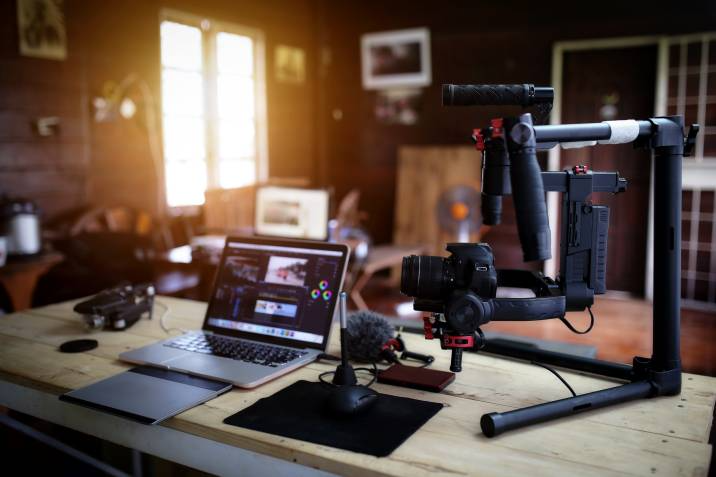- Home/
- Guides/
- Videographers/
- Earn Money with Videography

7 Ways to make money with videography: Ideas, niches, & tips
Wanna learn how to make money with videography? Check out our ultimate guide.
Browse videography tasksLast Updated on
Whether you have a career in videography and want to earn supplementary income or are a hobbyist looking for gigs to build your portfolio, there many opportunities you can explore within the videography niche.
In this guide, we’ll cover how to make money as a videographer, the average income you can expect, particular niches you can delve into, and additional tips to help you.
How much do videographers make?

The average day rate for videographers clocks in at an average of $31 an hour. However, that also depends on the type of video coverage you’ll be doing.
Clients need to consider the nature of the video production—video length, crew size, location, editing needs, and more. For instance, event coverage can start from $2,200.
Below are some of the most popular videography niches.
Profitable videography niches
Niche |
Video types |
What it covers |
Average cost for videography |
Feature-length videos, highlight reels, wedding trailers, same-day edits |
Comes with unique challenges to capture key moments in weddings; involves cinematography, editing, and post-production skills |
$2,000–$3,500 |
|
Listing, testimonial, and guided tour videos |
Uses specific videography movements and techniques (such as 360 video), video marketing, pre- and post-production skills, editing |
$100–1,000 |
|
Explainer, training, testimonial, brand videos |
May not always need pre- and post-production work (some companies handle it themselves) |
$120–250 per hour |
|
Full-length coverage, highlight reels |
Needs depend on the type of event |
$1,000–$3,000 |
|
Feature-length videos, vlogs, highlight reels |
Cinematography, post-production, editing |
Varies |
Sources: Easy Weddings, Open Agent, Angus Ashton Film, Video Outcomes
7 ways to make money as a videographer
You can explore many types of videography jobs, but unless you have industry experience, you’ll likely start out with a freelance videography gig. Outside of the well-known niches mentioned above, here are a few more ideas on how to make money as a videographer.
1. YouTube/vlogging

If you’re not ready to take on professional gigs, creating and posting videos on YouTube is one of the most powerful ways to demonstrate your videography skills. If they appeal to many viewers, you may be eligible for monetization. It’s also a great way to hone your skills and exchange feedback among like-minded vloggers and bloggers.
2. Stock footage
Something to keep in mind when you have b-roll (or secondary) footage is that you can make videos for money by selling them as stock footage. So, take high-quality videos, even when you’re only shooting supplementary footage. Like stock photos, you can sell stock videos on sites like Shutterstock.
3. Courses

Selling courses can be an evergreen way to make money with videography. You can create videos where you have topical authority on to share your knowledge and skills, which can become a source of passive income.
4. Crowdfunding
Got a project waiting in the pipeline? You can explore crowdfunding to raise money for your creative pursuits, such as an independent film or documentary. While this doesn’t quite count as a way to earn income, it can help you raise funds toward completing personal work, which can bring in the big bucks in return. Some popular crowdfunding platforms include Kickstarter and Indiegogo.
5. Films and documentaries

Consider offering your services and collaborating with film and documentary makers. While these gigs may be hard to come by and may end up being more of a passion project than an income channel, keep in mind that perseverance is key. You may want to start small with small features like music videos and work your way into the industry. Or, you may work on getting a project of your own.
6. Freelance work and competitions
You can always take the freelance route and look for short-term projects with us, here on Airtasker. Our platform can teach you how to get clients as a videographer—and you have the freedom to take up whatever job suits you best. Alternatively, you can seek out competitions on sites like MoFilm.
7. Rent out your gear

If you’ve invested much into your video gear, this is a fuss-free way to earn passive income. If you have some extra older cameras or other equipment you don’t often use, you can consider renting them out for a fee.
Tips to earn more money
Invest in gear: If you’re looking to be in the game long-term, high-quality gear will allow you to refine your work and master various niches. For instance, you need a compact camera with weatherproofing to shoot travel videos, while a drone provides beautiful shots for wedding reels. (Plus, you always have the option to rent out your gear when you’re out of work.)
Master editing: Perhaps you’re a pro behind the camera, but to successfully upskill, you need to wear many hats. Also, being a skilful video editor can lead you to more lucrative projects.
Advertise your work: Harness the power of social media to showcase your work—this may lead to future collaborations and clients and do wonders for your branding as a professional. Also, request reviews and testimonials from people you’ve worked with.
Keep shooting: Continue shooting videos on your own time. You can use this to beef up your videographer portfolio or as shareable content on your website and social media. Sooner or later, your work is bound to get in front of the right audience.
Earn as a videographer
Through various gigs and side hustles, it is possible to earn extra income doing video. By pursuing these ways to make money as a videographer, you can also build your skillset and grow your portfolio. Get started today on Airtasker and finding leads!
Frequently asked questions
Once you’ve figured out how to get work as a videographer, the next step is deciding on how you want to get paid. This heavily depends on the niche and job you take up. Some videographers are paid at an hourly rate, while some charge per project or package.
Because videography is usually a more complex job than photography, commercial videographers do get paid more than commercial photographers.
Create your profile and start browsing jobs in minutes
Start earning now
Related articles